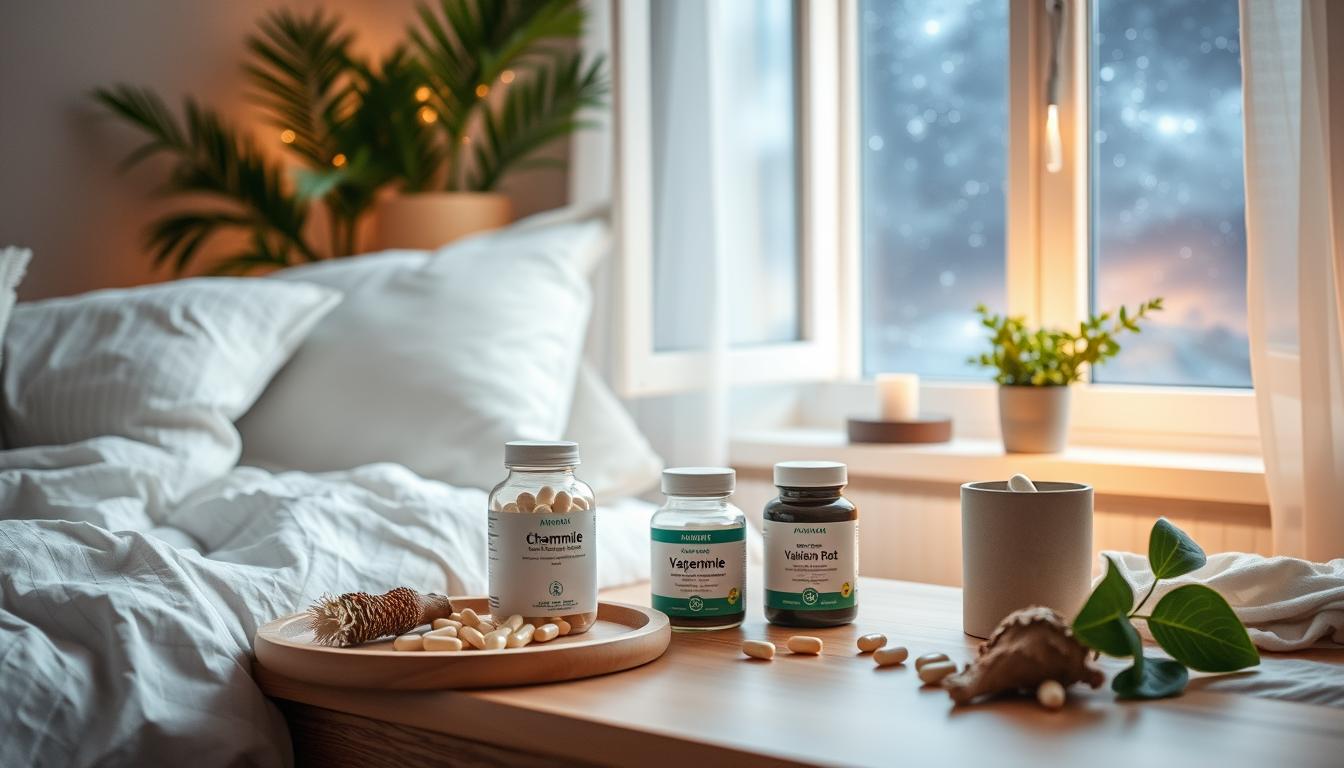Sleep apnea can be tough, but there’s hope. Natural supplements are becoming popular for treating it. In 2024, we have more options than before for natural sleep apnea treatment.
We’re here to help you find natural remedies for better sleep. Our goal is to share easy-to-understand info about these supplements. We’ll look at how they work and if they’re good for you.
Ready to find the best natural solutions for sleep apnea? Let’s explore how these supplements can change your nights and days.
Understanding Sleep Apnea
Sleep apnea is a common sleep disorder that many don’t fully understand. We’ll look into what it is, its types, and symptoms. Knowing these can help us see how supplements for obstructive sleep apnea might help.
What Is Sleep Apnea?
Sleep apnea happens when we stop and start breathing during sleep. These pauses can last from seconds to minutes. They can happen up to 30 times an hour, disrupting our sleep and causing health problems.
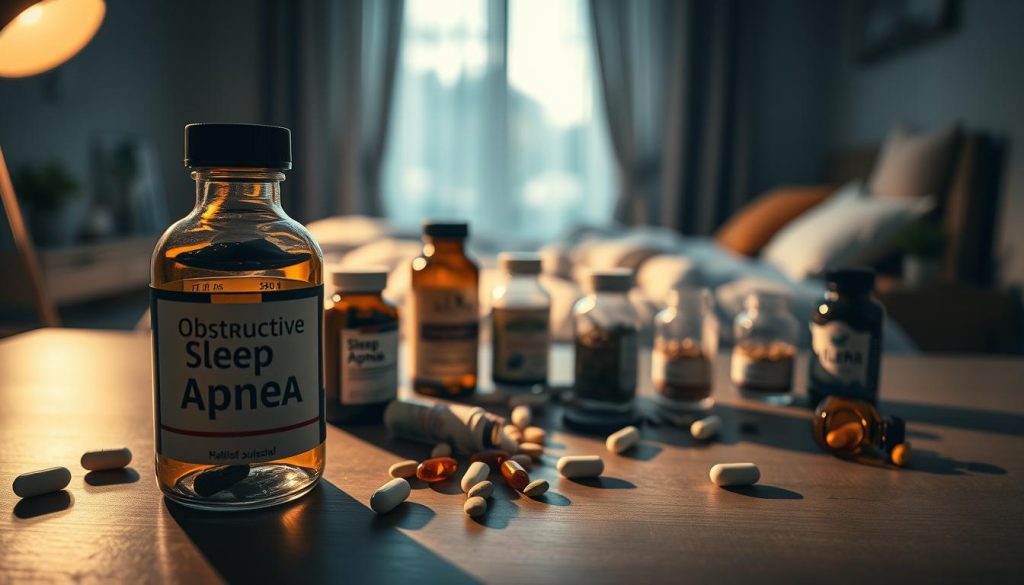
Types of Sleep Apnea
There are three main types of sleep apnea:
- Obstructive Sleep Apnea (OSA): The most common type, caused by throat muscles relaxing
- Central Sleep Apnea: When the brain doesn’t send proper signals to breathing muscles
- Complex Sleep Apnea: A combination of both obstructive and central sleep apnea
Symptoms We Might Experience
It’s important to know the symptoms of sleep apnea for early treatment. Some common signs include:
| Nighttime Symptoms | Daytime Symptoms |
|---|---|
| Loud snoring | Excessive daytime sleepiness |
| Gasping or choking during sleep | Morning headaches |
| Restless sleep | Difficulty concentrating |
| Night sweats | Irritability or mood changes |
Understanding sleep apnea and its symptoms helps us see if we need supplements or other treatments. Always talk to a healthcare professional for the right diagnosis and advice.
The Importance of Sleep Quality
Sleep quality is key to our health and happiness. Not getting enough sleep can affect our lives in many ways. For those with sleep apnea, finding natural ways to stop snoring can greatly improve sleep.
How Sleep Apnea Affects Us
Sleep apnea can really disrupt our daily lives. We might feel tired all day, have trouble focusing, and feel moody. If left untreated, it can cause serious health problems:
- High blood pressure
- Heart problems
- Type 2 diabetes
- Liver issues
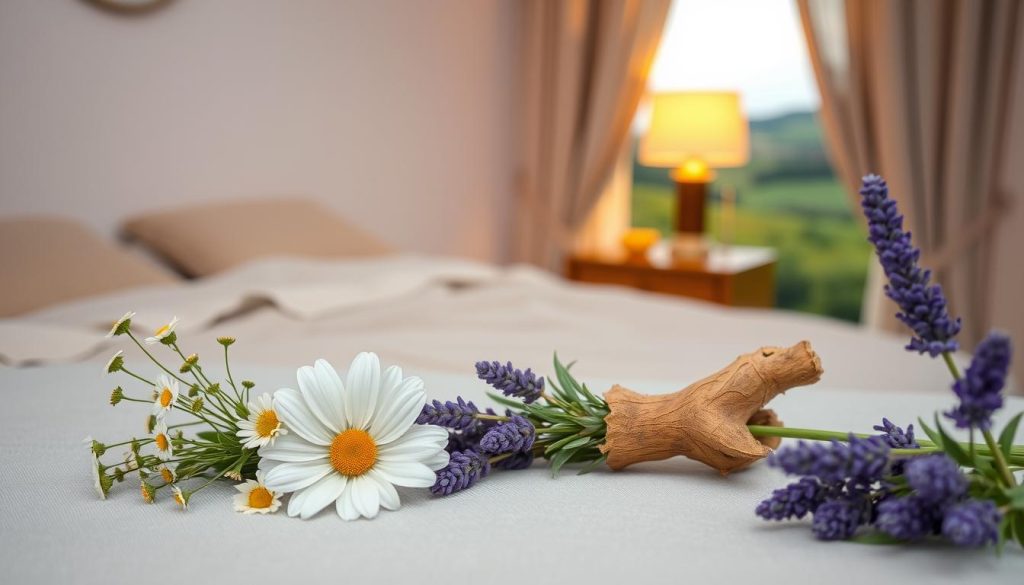
Benefits of Restorative Sleep
Getting quality sleep can change our lives for the better. When we sleep well, we enjoy many benefits:
| Benefit | Impact |
|---|---|
| Improved memory | Better retention and recall of information |
| Enhanced mood | Reduced risk of depression and anxiety |
| Stronger immune system | Increased resistance to illnesses |
| Weight management | Balanced hormones that regulate appetite |
By looking into natural ways to stop snoring and treating sleep apnea, we can gain these benefits. Quality sleep is essential for our health and happiness.
Natural Supplements Overview
Natural supplements are becoming more popular for treating sleep apnea. People are looking for gentler ways to manage their sleep. These natural options offer a unique way to tackle sleep apnea symptoms.
Why Choose Natural Supplements?
Many choose natural supplements because they have fewer side effects. They work with our body’s natural processes, helping us feel better overall. For those with sleep apnea, these supplements can be a key part of a healthy lifestyle.
Common Options Available
There’s a wide range of natural supplements that may help with sleep apnea. Let’s look at some popular choices:
| Supplement | Potential Benefits | Form |
|---|---|---|
| Melatonin | Regulates sleep-wake cycle | Pills, gummies, liquids |
| Valerian Root | Promotes relaxation and sleep | Tea, capsules, tinctures |
| Magnesium | Improves sleep quality | Tablets, powders |
| Lavender | Reduces anxiety, aids sleep | Essential oils, teas |
These herbal sleep aids offer different ways to support better sleep. As we explore alternative therapies for sleep apnea, it’s important to remember that what works best can vary from person to person. In the following sections, we’ll dive deeper into each of these options.
Melatonin and Its Benefits
Melatonin is a favorite among those looking for sleep apnea relief. It’s a natural hormone that helps control our sleep patterns. Let’s dive into how it works and the best dosage for the best results.
How Melatonin Works
Melatonin is made in our bodies when it gets dark. It tells our brain it’s time to sleep. For people with sleep apnea, taking melatonin can help fix their sleep cycle and improve sleep quality.
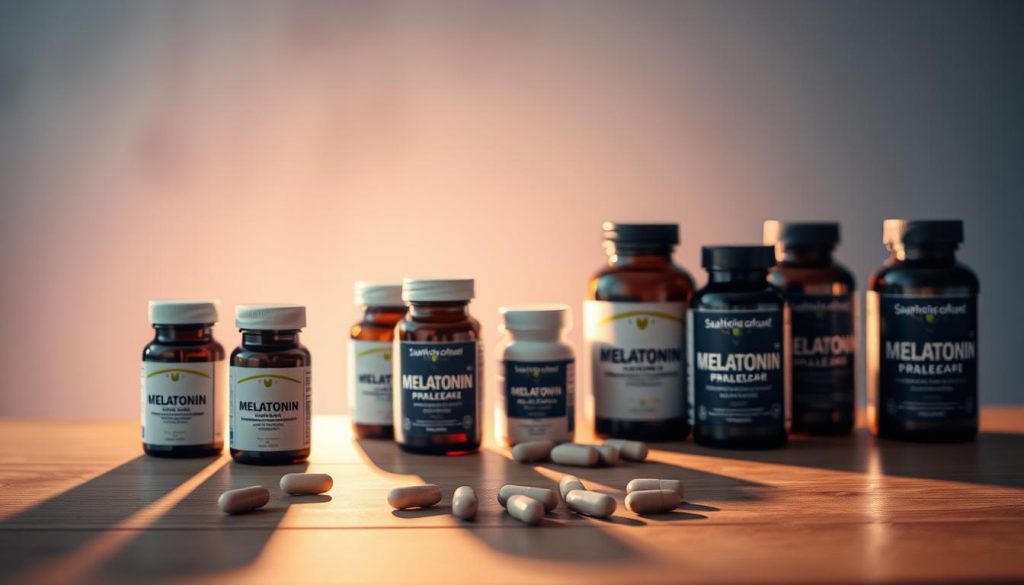
- Reduce the time it takes to fall asleep
- Increase total sleep time
- Improve sleep efficiency
Recommended Dosage
Finding the right amount of melatonin is crucial for sleep apnea management. Here’s a basic guide:
| Age Group | Recommended Dosage | Timing |
|---|---|---|
| Adults | 1-5 mg | 30-60 minutes before bedtime |
| Older Adults | 1-2 mg | 30-60 minutes before bedtime |
| Children (with doctor’s approval) | 0.5-3 mg | 30-60 minutes before bedtime |
Start with a small dose and adjust as needed. Always talk to a healthcare professional before adding new supplements to your routine.
Valerian Root: A Natural Remedy
Valerian root is a top choice for natural sleep apnea remedies. It has been used for centuries to help people relax and sleep better. Let’s see how it can help manage sleep apnea symptoms and improve our sleep.
Effectiveness in Providing Sleep
Studies show that valerian root can improve sleep patterns. It boosts levels of gamma-aminobutyric acid (GABA) in the brain. GABA calms nerve activity. This might cut down on sleep apnea episodes, making nights more peaceful.
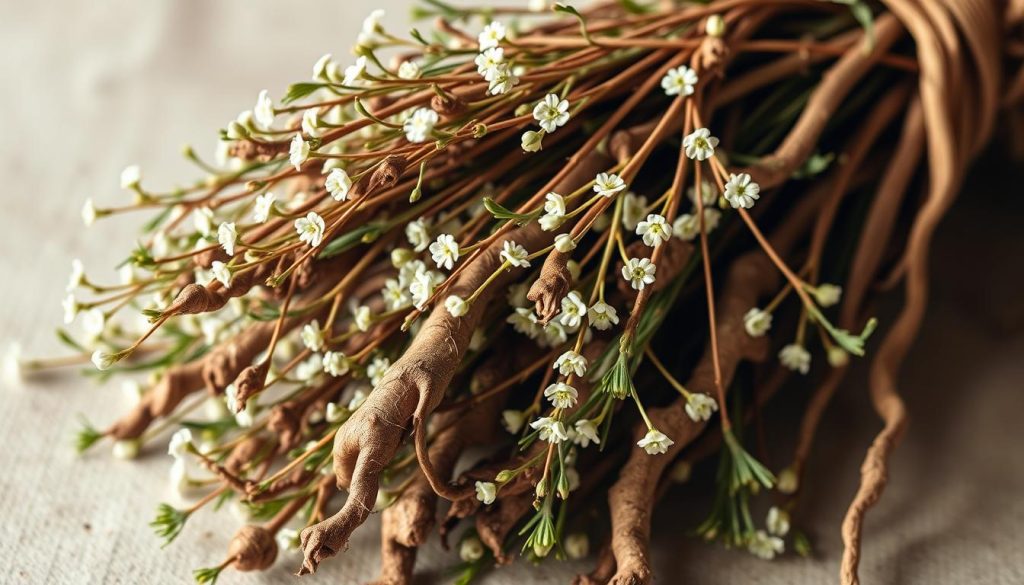
How to Incorporate Valerian Root
Adding valerian root to our bedtime routine is easy. It comes in different forms:
- Capsules or tablets: Take 300-600 mg about an hour before bedtime
- Tea: Steep 2-3 grams of dried valerian root in hot water for 10-15 minutes
- Liquid extracts: Follow the dosage instructions on the product label
Start with a small dose and increase if needed. Always talk to a healthcare provider before using valerian root, especially if you’re on other meds or have health issues.
Other Herbal Supplements
Nature has many herbal sleep aids for sleep apnea. We’ll look at some popular ones that help improve sleep quality.
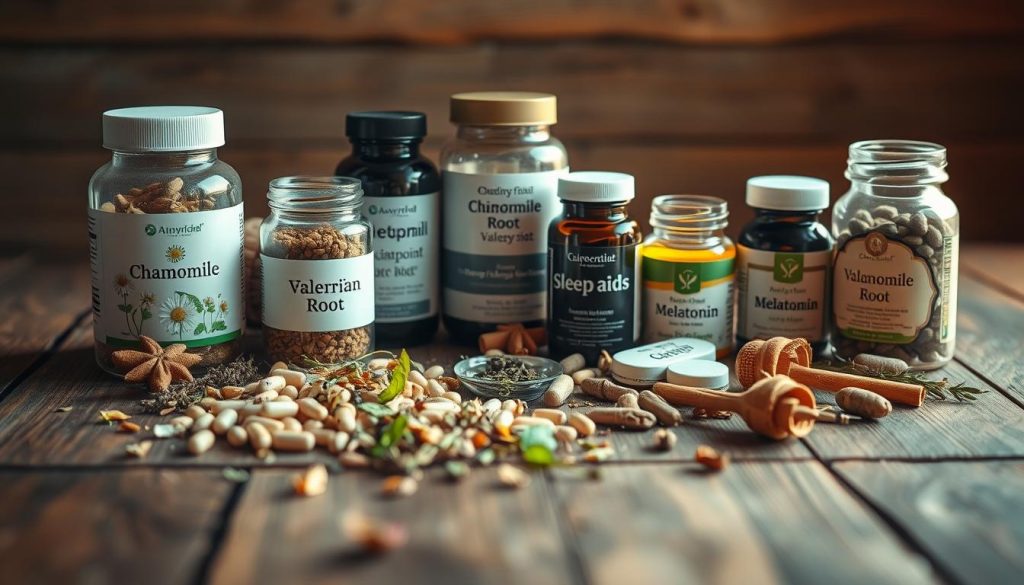
Chamomile for Relaxation
Chamomile tea is a well-known sleep aid. It has calming effects that help us relax before bed. Drinking a cup of chamomile tea an hour before bed can ease us into a good night’s sleep.
Passionflower’s Role in Sleep
Passionflower is another option for sleep apnea relief. It can reduce anxiety and improve sleep. We can find passionflower in tea or as a supplement. Start with a low dose and increase as needed.
Lavender and Its Calming Effects
Lavender is known for its soothing scent. We can use lavender essential oil in a diffuser or on our pillow. Its calming aroma may help us relax and prepare for sleep, easing sleep apnea symptoms.
| Herbal Supplement | Form | Potential Benefits |
|---|---|---|
| Chamomile | Tea, capsules | Relaxation, stress reduction |
| Passionflower | Tea, tincture, capsules | Anxiety relief, sleep quality improvement |
| Lavender | Essential oil, tea | Calming effects, sleep preparation |
These herbal sleep aids offer natural ways to manage sleep apnea symptoms. Adding them to our bedtime routine may help us sleep better.
The Role of Magnesium
Magnesium is key to our body’s functions, including sleep. It helps those with sleep apnea and boosts our sleep quality.
Benefits for Sleep Quality
Magnesium relaxes muscles and calms the nervous system. This can help with breathing problems in sleep apnea. It also helps make melatonin, our sleep hormone.
By eating foods rich in magnesium, we might sleep better and wake up less at night.

Recommended Sources
We can get more magnesium from foods and supplements. Here are some great options:
- Leafy greens (spinach, kale)
- Nuts and seeds (almonds, pumpkin seeds)
- Whole grains
- Fish (salmon, mackerel)
- Dark chocolate
For supplements, magnesium glycinate is a good choice. It’s easily absorbed and has few side effects. Always talk to a doctor before starting any new supplements, especially if you have sleep apnea.
Adding magnesium-rich foods or supplements to our diet can help us sleep better. Remember, vitamins and minerals are crucial for managing sleep apnea, and magnesium is an important part of it.
Omega-3 Fatty Acids
Omega-3 fatty acids are key for our health, including better sleep. They might help those with sleep apnea. Let’s see how they can improve our sleep and where to find them.
How They Aid Sleep
Omega-3s can help by reducing inflammation and controlling sleep hormones. Research shows they boost melatonin, our sleep hormone. This is great for those using supplements for sleep apnea.
Foods Rich in Omega-3s
We can increase our omega-3s with certain foods. Here are some:
- Fatty fish (salmon, mackerel, sardines)
- Walnuts
- Flaxseeds
- Chia seeds
- Soybeans
If diet alone is hard, fish oil supplements are a good backup. They help ensure we get enough omega-3s. Always talk to a doctor before starting new supplements, especially with sleep apnea.
Lifestyle Changes to Enhance Sleep
Making simple changes to our daily habits can greatly improve our sleep quality. Let’s explore some effective sleep apnea home remedies that focus on lifestyle adjustments.
Importance of a Consistent Routine
Sticking to a regular sleep schedule helps our bodies know when it’s time to rest. We should aim to go to bed and wake up at the same times every day, even on weekends. This trains our internal clock and can reduce sleep apnea symptoms.
- Set a fixed bedtime and wake-up time
- Avoid naps after 3 PM
- Create a relaxing pre-sleep ritual
Creating a Sleep-Conducive Environment
Our bedroom setup plays a big role in sleep quality. A few tweaks can turn our sleeping space into a haven for rest. Consider these sleep apnea home remedies for your bedroom:
| Factor | Ideal Condition | Benefits |
|---|---|---|
| Temperature | 60-67°F (15-19°C) | Promotes deeper sleep |
| Lighting | Dark or dim | Supports melatonin production |
| Noise level | Quiet or white noise | Reduces sleep disturbances |
| Bedding | Comfortable, breathable | Enhances sleep comfort |
By incorporating these sleep apnea home remedies into our daily lives, we can create an environment that supports better sleep and potentially reduces the impact of sleep apnea.
The Power of Aromatherapy
Aromatherapy is a natural way to better our sleep. It’s especially good for those with sleep apnea. Let’s see how essential oils can help us sleep better and learn how to use them.
Essential Oils for Better Sleep
Some essential oils help us sleep better. Lavender is at the top, with its calming scent. Chamomile, often in bedtime teas, is another good choice. Vetiver, with its earthy smell, helps us sleep deeper.
| Essential Oil | Benefits | Best Use |
|---|---|---|
| Lavender | Reduces anxiety, promotes relaxation | Diffuser, pillow spray |
| Chamomile | Calms nerves, eases tension | Bath, massage oil |
| Vetiver | Grounding, supports deep sleep | Diffuser, foot massage |
How to Use Aromatherapy
We can add aromatherapy to our bedtime routine in many ways. A diffuser can fill our room with calming scents. We can also put a few drops of essential oil on our pillow or in a warm bath.
For a relaxing massage, mix oils with a carrier oil. This makes the massage gentle and soothing.
Using aromatherapy in our sleep routine is a natural way to fight sleep apnea. It can work alongside other treatments for better sleep. Start with small amounts of essential oils and watch how your body reacts.
Combining Supplements with Medical Guidance
Natural sleep apnea treatment often includes supplements. But, it’s key to work with healthcare pros for a full plan. Let’s look at when to get expert advice and why a custom plan is important.
When to Consult a Professional
If symptoms keep coming back or get worse, see a doctor. Signs that mean you need help include:
- Excessive daytime sleepiness
- Loud, chronic snoring
- Gasping or choking during sleep
- Morning headaches
- Difficulty concentrating
Importance of Personalizing Treatment
There’s no one treatment for everyone with sleep apnea. Our bodies respond differently to treatments. So, we need plans made just for us.
A sleep specialist can help us make a plan. This plan might include:
| Treatment Component | Benefits |
|---|---|
| Targeted supplements | Address specific deficiencies |
| Lifestyle changes | Improve overall sleep quality |
| Medical devices | Provide necessary breathing support |
| Monitoring | Track progress and adjust treatment |
By mixing natural treatments with doctor advice, we can do better. Remember, talking openly with our healthcare team is crucial. It helps us find the best solution for our unique needs.
Potential Risks and Considerations
Natural supplements for sleep apnea can be helpful, but we need to be aware of possible risks. Let’s explore some important considerations to keep in mind when using these supplements.
Side Effects of Natural Supplements
While generally safe, natural sleep aids can cause unwanted effects. Melatonin might lead to daytime drowsiness or headaches. Valerian root can sometimes cause mild digestive issues. It’s crucial to start with low doses and watch how our bodies react.
Interactions with Other Medications
Natural supplements can interact with prescription drugs. For example, St. John’s Wort might reduce the effectiveness of certain medications. We should always inform our doctors about any supplements we’re taking to avoid potential complications.
| Supplement | Possible Interaction | Precaution |
|---|---|---|
| Melatonin | Blood thinners, diabetes medications | Consult doctor before use |
| Valerian Root | Sedatives, anti-anxiety drugs | Avoid combining without medical advice |
| Magnesium | Antibiotics, diuretics | Adjust timing of intake |
Remember, natural doesn’t always mean risk-free. We should approach natural supplements for sleep apnea with care and open communication with our healthcare providers. This way, we can safely incorporate these aids into our sleep apnea management plan.
Conclusion: Finding Our Best Solutions
We’ve looked at many natural ways to treat sleep apnea. Supplements like melatonin and valerian root are promising. They offer alternatives to traditional treatments. By trying these natural options, we can sleep better and feel healthier.
Embracing Natural Supplements
Natural supplements can change how we sleep. Melatonin helps us sleep and wake up right. Valerian root helps us relax. Omega-3 fatty acids and magnesium are also important.
By mixing different supplements, we can find what works for us. It’s all about finding the right fit for our needs.
Long-Term Strategies for Better Sleep
Supplements are just part of the solution. We need to think about long-term changes for lasting relief. Keeping a regular sleep schedule and creating a sleep-friendly space are key.
Good sleep hygiene is also crucial. Natural sleep apnea treatment is about making lifestyle changes. It’s about supporting our overall health.
Managing sleep apnea is a journey. It might take time to find the right mix of supplements and habits. But with patience and persistence, we can enjoy peaceful sleep and wake up feeling refreshed.

